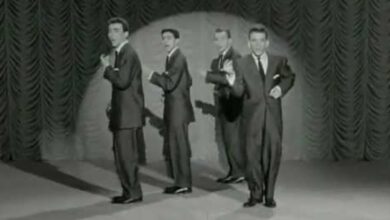The Kinks’ “Celluloid Heroes” Captures the Fragile Glory of Fame and Redefines Rock Storytelling in the 1970s
Released in 1972 and later immortalized in their 1980 live album One for the Road, “Celluloid Heroes” by The Kinks stood as a contemplative, emotionally resonant departure from the raw energy of the British Invasion sound that first defined them. A slow-burning anthem, it wasn’t a chart-topping single, yet it carved a permanent space in the hearts of fans and critics alike for its poetic tribute to Hollywood’s dream-makers and dream-breakers. Its power lay not in commercial explosion, but in the haunting realism of its message—making it one of the most affecting and enduring compositions in the Kinks’ catalog.
Formed in 1963 in North London by brothers Ray and Dave Davies, The Kinks began as one of the pillars of the British Invasion, riding high on gritty, riff-driven anthems like “You Really Got Me” and “All Day and All of the Night.” But while their contemporaries leaned heavily into blues and psychedelia, Ray Davies quickly distinguished himself as a songwriter with an eye for character-driven narratives and social commentary. By the early 1970s, the band had evolved from rebellious rockers to chroniclers of life’s bittersweet intricacies—delivering with “Celluloid Heroes” a track that marked a new maturity and depth in their work.
The inspiration behind “Celluloid Heroes” stemmed from Ray Davies’ growing fascination with the illusory nature of fame. A walk down Hollywood Boulevard sparked the vision: countless stars embedded in the sidewalk honoring screen legends—many long gone, some still venerated, others forgotten. Ray channeled his observations into lyrics that were both personal and universal, referencing luminaries like Greta Garbo, Bela Lugosi, and Bette Davis not as flawless icons but as complex, often tragic figures. The song became a meditation on how the pursuit of stardom often ends in heartbreak, offering listeners a piercing look beneath the glitter.
The studio version of the track, produced by Ray Davies himself, leaned on subtlety over spectacle. A gently swaying rhythm section and elegant piano lines allowed the focus to remain on Ray’s vocal delivery—plaintive, weary, yet full of empathy. Unlike their early power-chord anthems, this arrangement invited introspection. When re-recorded for One for the Road, the song’s live rendition preserved that same intimacy, even in the setting of a large venue. Ray’s voice, seasoned and wistful, elevated the song’s narrative to almost spiritual terrain, giving it even more emotional weight in front of a live audience.
Though not a major chart success at the time of release, “Celluloid Heroes” received significant critical acclaim and steady airplay on FM radio, especially in the U.S., where its reflective tone and American subject matter found a particularly receptive audience. Over time, it became a cult favorite, especially among musicians and storytellers who admired its nuanced take on fame. While it didn’t win awards, it won something arguably more meaningful: the long-term affection of those who valued honesty and human vulnerability in songwriting.
Culturally, the song offered a rare rock perspective that diverged from the glamorization of celebrity. At a time when rock music was beginning to flirt heavily with superstardom and myth-making, “Celluloid Heroes” served as a sobering reminder of what lies behind the curtain. It challenged listeners to rethink their relationship with fame and those who attain it. This shift was subtle, but important—it allowed rock to explore a richer emotional spectrum and opened the door for introspective tracks by later artists.
The song’s release marked a turning point for The Kinks in the American market. While they’d enjoyed previous hits, “Celluloid Heroes” positioned them as thoughtful chroniclers of life’s complexities, attracting a more mature, discerning audience. The 1980 One for the Road live album further cemented this status, revitalizing their U.S. presence and leading to successful tours throughout the decade. It proved that even without topping the charts, a song could redefine an artist’s career direction.
Musically and thematically, “Celluloid Heroes” helped pave the way for the kind of reflective songwriting that artists like Bruce Springsteen, Elvis Costello, and later bands like R.E.M. would explore. Its cinematic storytelling, blending personal reflection with cultural observation, inspired others to look beyond the self in their lyrics. It didn’t create a new genre, but it expanded the emotional and intellectual ambition of rock songwriting.
Notable artists have since paid tribute to the song, including Joan Jett and Bon Jovi, both of whom cited it as a lyrical influence. Ray Davies himself revisited it in solo performances, often introducing it with heartfelt anecdotes about the people who inspired its lines. While few artists have attempted to cover it directly—perhaps out of reverence—its spirit echoes in many rock ballads that followed.
The release of “Celluloid Heroes” also coincided with a turbulent time in Ray Davies’ personal life, including a breakdown in his marriage and struggles with depression. The emotional resonance in the song can be partially attributed to this backdrop, lending the lyrics a raw sincerity that transcends mere artistic concept. It wasn’t just commentary—it was catharsis.
In the decades since, “Celluloid Heroes” has continued to appear on classic rock radio playlists and retrospective compilations, often cited as one of The Kinks’ greatest achievements. It is a staple in discussions of the band’s legacy and is regularly featured in documentaries and anthologies that chart the evolution of thoughtful songwriting in rock.
The song also contributed to evolving norms in rock production. Its unhurried pacing and lyrical density encouraged a move away from strict radio-friendly structures, foreshadowing the rise of more narrative-driven songs in the singer-songwriter tradition. It showed that rock music could be both melodic and literary, poignant yet accessible.
While Ray Davies received a knighthood in 2017 for his contributions to music, “Celluloid Heroes” remains one of the most enduring pieces of his legacy. Though not a chart smash, it has aged gracefully—perhaps even gaining more relevance in an era of viral fame and fleeting celebrity. Its message about the human cost of adoration has only grown more powerful with time.
Ultimately, “Celluloid Heroes” endures not because it dazzled, but because it revealed. It pulled back the velvet curtain on the dream machine and reminded us that the lights of Hollywood shine brightest on those who have already given more than they could afford. In a catalog filled with bold anthems and cheeky satire, this song remains The Kinks’ most solemn and sincere portrait of fame—and one of the most meaningful songs ever written about the illusions we choose to believe.



